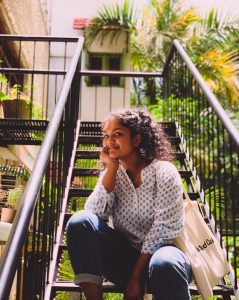

Year of Study During Placement: 4th
Faculty and Major: Bachelor of International Economics (BIE)
Placement Course and Year: SOCI 495F, 2019
Placement Country: India
Placement Organization: Meghshala
Roshni participated in Sociology 495F in 2019 (current course is now named ASTU 401I). She was placed with Meghshala, an education technology non-profit in Bangalore, India. She worked on a project and researched how traditional cultural practices, like handloom saree weaving, could be encouraged by using education technology and classroom lessons. Roshni conducted field visits and spoke to handloom weavers, Meghshala product creators, and members of the saree preservation industry to create a set of key principles that can be applied to classroom lessons to preserve cultural practices.
How did taking an academic course as a pre-req before you went on placement influence your ability to conduct your main project?
Having the practical skills to conduct qualitative research was a huge benefit from taking an academic course before my placement, especially since I had only done quantitative research up until this point. The SOCI class I took did a great job of balancing the theoretical/academic with the practical and helped in providing a framework to refer to when doing research.
What did you learn through your ISL experience? What was your biggest challenge?
Through the whole ISL experience, I learned to deal with uncertainty. I’m sure this is a takeaway for a lot of ISL participants, but we are so used to knowing what is expected of us that it’s a challenge to deal with the unknown. This was also my biggest challenge – being able to trust my own intuition and decisions when it didn’t seem like there was any one right answer. Although I had support from my peers, ORICE, and Meghshala, I still had to make decisions that impacted the whole research process. This was the greatest learning experience I could have, and of course, was also a big challenge.
How has your participation in ISL influenced your life path, career, and/or academic trajectory?
ISL has, first and foremost, influenced the way I view and solve problems. The importance of intentionally seeking out and removing barriers for underrepresented voices in community-based research was illustrated firsthand for me, and I know that whatever I choose to do will have to incorporate that mentality. This is more of a general life principle than a specific career path, but ISL has provided me with different lenses through which to view policy and research decisions.
What are you up to nowadays?
I’m currently finishing my last co-op term, and then will be finishing my Bachelor’s in the spring! After that, I’ll be starting a Master of Management program and looking for new opportunities.


